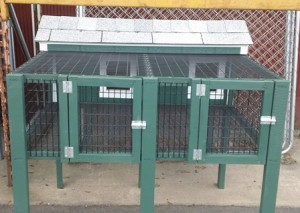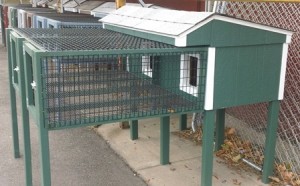We talk a lot about indoor rabbit care, but what about those rabbits that are kept outdoors? Good husbandry and proper housing is just as important for outdoor rabbits as those kept inside your home.
One common practice that many well intentioned rabbit owners do is putting their pet rabbit in the same pen that houses their chickens or goats. Some will even let the rabbits live on the ground loose without an elevated area inside the pen that the rabbit can retreat to.

Rabbit in pen with chickens
It simply is not an ideal situation to house rabbits together with other outdoor animals such as chickens or goats, and here is why:
The most common intestinal microscopic parasite of rabbits, goats and birds (especially chickens, ducks and geese) is Coccidia. These parasites found in the animals’ stool multiply invisibly on the floor close to the ground, especially in chicken floor spaces.
Chickens carry lots of Coccidia. Rabbits, especially young rabbits, who get infected with Coccidia can develop growth retardation and stop eating. They can also experience diarrhea, constipation, liver failure and eventual death.
Goats who are housed next to chickens are even more susceptible to developing Coccidia induced diarrhea. They can stop eating, become dehydrated and eventually die. Very young goats (those who are less than four months old) are especially susceptible.
Outdoor rabbits need clean living areas that are kept free from manure of any sort daily. They need hutches with good ventilation so they don’t get stressed and be at increased risk for serious Pasteurella respiratory infections.
Chickens defecate constantly. They are messy and create dusty areas due to the way they eat. So again, chickens should not be sharing the same floor space with pet rabbits. Furthermore, rabbits who eat chicken food are at risk to develop an intestinal blockage, and this is cause for an emergency situation to an unsuspecting pet owner.
Rabbits would do better in an elevated, mostly wire hutch with a section that is totally wood enclosed (top and bottom) where they can get in from the cold and hopefully hide from a fox or raccoon patrolling around at night. Their stool can then fall below through the wire area of the hutch, while the rabbit can still enjoy safe shelter off wire.

Properly constructed Rabbit Hutch – front view

Properly constructed Rabbit Hutch – side view
If you want to have a rabbit loose in a pen because you have trained them and handled them extensively since birth, then go ahead. However, please make sure the pen is clean, secure and just for rabbits. If you leave them in a pen overnight or during the day without supervision, a hawk or a fox will get them sooner or later. At night, foxes can tear through flimsy enclosures as well as dig under bottom fencing that is not buried deep enough. They will bite the toes off rabbits who are housed on wire enclosure with no solid bottomed shelter.
Also important to know is that bunnies are more susceptible to heat stroke from temperatures greater than 85 degrees F. You should roll or move their hutch into a cool garage or under a tree for shade when the temperature climbs. Also, place a frozen plastic milk jug inside their hutch. The jug will keep your rabbits cooler while the jug slowly thaws.
That being said, rabbits can get frostbite if left outside in severe, bitter cold weather without a proper solid shelter. We recommend moving their hutch to a warm garage or shed for those nights that are just too severe to be safe.
Joe Martins, DVM, Belle Mead Animal Hospital

Joe Martins, DVM, Belle Mead Animal Hospital


